My second press release! As featured on Health & Wellbeing Online Magazine on 22nd of July, 2024. See it following line HERE.

Most of us live our lives going from one event to another, and then, one day, we look around and realise: this is something that doesn’t even remotely resemble the dream I had about my life when I was a child.
Alternatively, there is another version of awakening.
One day you wake up and realise that although you have everything that you thought you wanted and you thought would make you happy…it doesn’t.
The Confusing Awakening
Both of the scenarios above can be quite painful and disorienting. After all – we all do things that we believe are the right things to do, at least most of the time. Therefore, it can be a surprise when you realise you’re living a life that is not really YOURS.
And then these questions come to your head:
“How did this happen to me?”
“What did I do wrong?”
“Maybe there is something wrong with ME…”
“Why do I feel so confused?”
To answer all of these questions can be both simple and complicated at the same time.
What is happening, in a nutshell, is a realisation that the things you have are not really things that YOU WANT to have, but you THINK YOU SHOULD WANT to have. With that, there may be a weird feeling of you being a “stranger” in your own life, maybe even having experiences of watching yourself or your life as if through glass, feeling separated from it, as if you are in it, but not really connected to it.
If you are reading this and thinking “Oh my God, that’s me!” I want to tell you that there are many of us who have felt or are feeling like that. Also, I want to tell you that it is not your fault. Instead, I want to explain how this has happened and what to do about it.
So now let’s get into the more complex and deeper question – the root cause of what you’re experiencing.
<…> that non-secret secret is me understanding that we have a relationship with our bodies.
How Did It Start?
The story likely began some time ago within the family or with the caregivers you were blessed with or not so blessed with. It could also stem from a lack of caregivers. The very roots of the problem lie in the fact that as children, we are not able to choose our values, or in other words, what is going to be important in our lives. For most of us, these decisions were not made by us.

The very roots of the problem lie in the fact that as children, we are not able to choose our values, or in other words, what is going to be important in our lives. For most of us, these decisions were not made by us.
Our early environment determined them. Not us. And while it is normal for all human beings to experience this, if we do not clarify and adjust this later in life, it can cause problems.
But to understand how it all plays out, let’s take a look at three scenarios.
Scenario 1.
You were told that family is important, and it is the only and most important thing that can ever be. One should prioritise family and sacrifice oneself for the family. Everyone around you did it, and people who attempted not to do it were called “bad” and “selfish”.
Scenario 2.
You were told that money is important, and this is the only thing that will ever make you happy and create a sense of worth and security. Everyone around you lived and acted as if it were true. And you saw the consequences of your poor uncle really struggling because he never managed to get a well-paid job.
OR
You were told that people who have money are bad people. And you observed that rich people indeed were mean and poor people (in your environment) were much kinder and “good”.
Scenario 3.
Suppose you were told that education is important, and only educated people can be respected, achieve something, or are worthy to be taken seriously. In this case, you may have been living either by trying to get as much education as possible or by noticing the lack of education you had and seeing it as a reason why something is not going well in your life.
So what’s wrong with those values?
Looking from the outside – nothing.
The problem starts when we adopt this value and live according to it without ever really analysing or understanding what that value means for us and how a healthy, aligned scenario of living by that value looks.
When the value is automatically inherited from the family and/or our environment, we can build our lives on the wrong foundations without realising it.
Most of us have never stopped to think about it and without even questioning if those foundations truly belong to us, emanating from our hearts.
If we haven’t gone through the process of truly examining and evaluating what we are living by and how many of those things are OURs and how many belong to SOMEONE ELSE, we cannot say we are truly living our own lives and that we have firm foundations.
If the foundations upon which we have built our lives don’t really belong to us, they can crack and be taken away from us quite quickly.
Let’s look at how it may happen.
Consequences Of Building On Foundations That Are Not Ours
In scenario one, if the value of FAMILY that you have adopted is not truly your own, it could be that you now feel burdened by the obligation to be part of your family.
You may actually have strained relationships with certain family members, but you might not feel entitled to stand up and say “stop it, I cannot accept this behaviour.”
Instead, you may feel compelled to endure it because it is family, and family is something we cannot abandon.
So in this scenario, you would continue participating in unhealthy dynamics without realising that you have a CHOICE. And without a choice, you lack power in that situation. Once you recognise that you have a choice, you begin to have options.
How do you get to have a choice in this situation?
Consider how the value of family aligns with your most intimate self. Is it true that your birth family holds importance to you?
Perhaps yes, perhaps no.
You might find that family indeed holds significance, but within that belonging, you may seek adjustments. For instance, while remaining a part of your birth family, you assert the right to be treated with respect and to enjoy your freedoms.
Taking it further, you may harbour another deeply held personal value that you’re presently suppressing. To feel healthy and fulfilled, you’ll need to create space for it and adjust how much attention you give to your family compared to this other value in terms of time and energy.
Alternatively, you might conclude that you don’t prioritise family as a value. Maybe your individuality holds more weight for you. Perhaps you value solid friendships over blood ties. Or you might challenge the conventional definition of family altogether.
<...> you may harbour another deeply held personal value that you’re presently suppressing. To feel healthy and fulfilled, you’ll need to create space for it and adjust how much attention you give to your family compared to this other value in terms of time and energy.
Once you’ve proactively determined and reviewed your values, you can confidently build upon your own foundation.
Now, let’s consider a second example. Imagine you’ve been told that:
A) Money is paramount, and lacking it spells trouble.
OR conversely, perhaps you’ve been indoctrinated with:
B) Money dominates everything, and those with wealth are inherently bad people.
In either case, because money has been depicted as pivotal in life, you might feel compelled to obsessively ensure you possess enough, feeling inadequate if you fall short. You might even resent having to work in a corporate job you dislike just to earn money. Yet, deep down, you might identify as an artist, philanthropist, or someone who finds fulfilment in helping others. Pursuing a value that isn’t yours, you may find yourself leading a life out of sync with your core self, leading to unhappiness and unfulfillment.
Conversely, embracing the belief that money isn’t paramount, you might prioritise personal connections and self-expression. Or, if money does hold significance to you, you might feel genuinely fulfilled and secure with abundant wealth, even envisioning grand contributions to society.
In each case, once you’ve examined and aligned with your values or beliefs regarding money, you can tailor them to fit your own, modifying your foundation and thereby improving your life quality.
Happiness was anticipated as the reward at the end of struggle. Yet, upon reaching that destination, happiness eludes you, leaving you feeling disappointed, perhaps even as if you’ve failed to execute the formula.
Now, let’s delve into a final example. Suppose your parents or caregivers, having experienced hardships due to lack of education, firmly believe that education is the key to success.
They emphasise that acquiring education and qualifications will lead to success and fulfilment, especially in esteemed professions. Believing this, you invest years pursuing a profession you’ve been told is “right” (such as doctor or lawyer), only to find yourself utterly miserable.
If our body is an entity, if our body has feelings, how we treat our body is the reflection of how we feel about ourselves.
In this example, it’s evident how building a life on a foundation that isn’t truly yours can unfold: years invested in a pursuit expected to bring happiness and fulfilment, only to be left with disappointment.
It’s common to feel disillusioned with life when things don’t turn out as expected. This disillusionment stems from following a theory or formula not out of genuine enjoyment or passion but because you believed it was necessary for happiness.
Happiness was anticipated as the reward at the end of struggle. Yet, upon reaching that destination, happiness eludes you, leaving you feeling disappointed, perhaps even as if you’ve failed to execute the formula.
In reality, many of us have lost the joy of living because we’ve expended energy on pursuits not truly our own.
These foundational values were inherited rather than chosen, forming a foundation that isn’t genuinely ours.
How to know the difference?
Building on your foundation entails investing your time and organising your life around core values you wholeheartedly believe in. In this scenario, your satisfaction and sense of fulfilment derive from the process itself, not merely its outcome.
How living by the aligned values would look like?
So, using the examples mentioned, if you were to spend time with your birth family and relatives, you would feel like you are part of a community, part of a bigger unit.
You would derive satisfaction from the sense of belonging, have a reliable support system, and enjoy your interactions, exchanges, and contributions toward the family.
If you were truly sincere about the importance of money in your life, you would enjoy creating security, learning about finances, and feeling a sense of achievement by building wealth.
If education were a genuine value for you, it would bring you joy and satisfaction to gain new knowledge, participate in discussions, learn new things, and maintain a curious and open attitude.
So, there’s a significant difference in the quality of emotions that you experience by investing your time in these areas.
By dedicating our time and effort to aspects of life that genuinely align with our personal values, we find fulfilment in the process itself, rather than waiting for an end result.
By dedicating our time and effort to aspects of life that genuinely align with our personal values, we find fulfilment in the process itself, rather than waiting for an end result.
How to find out what foundations are genuinely yours.
Ask yourself these questions:
- Do I feel safe in my life?
- Do I feel satisfied in my life?
- What areas of my life do I hate?
- What areas of my life do I love?
- If I were to die tomorrow, what would be my biggest regrets?
Note: Some of the questions above might sound a little drastic, but bear with me – you are answering them to get to know your genuine emotions and recognise what areas are causing you to feel the most intense feelings. Both negative and positive feelings are good as they indicate the strength of harmony or discord. They are our compass.
Answers:
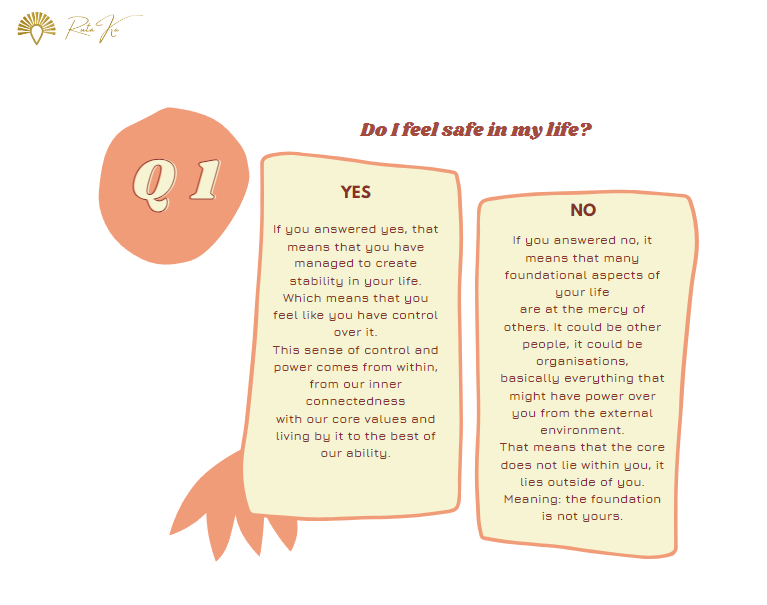
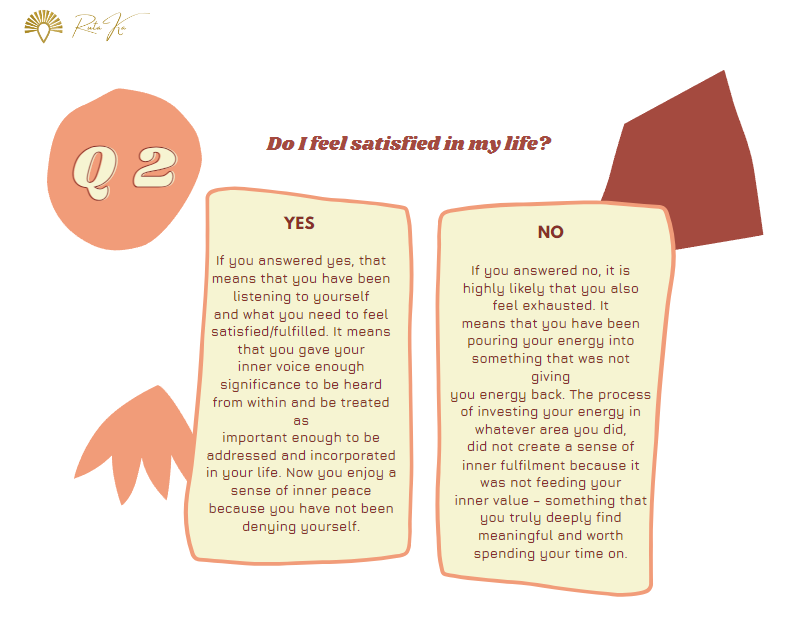
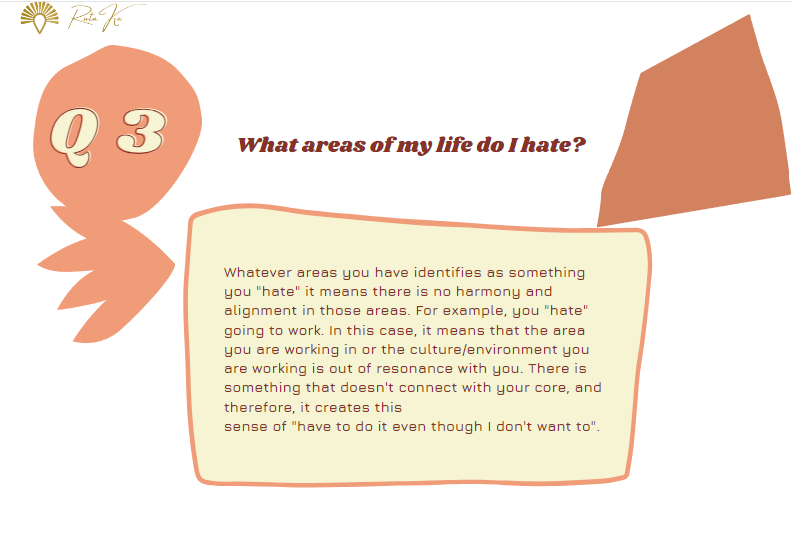
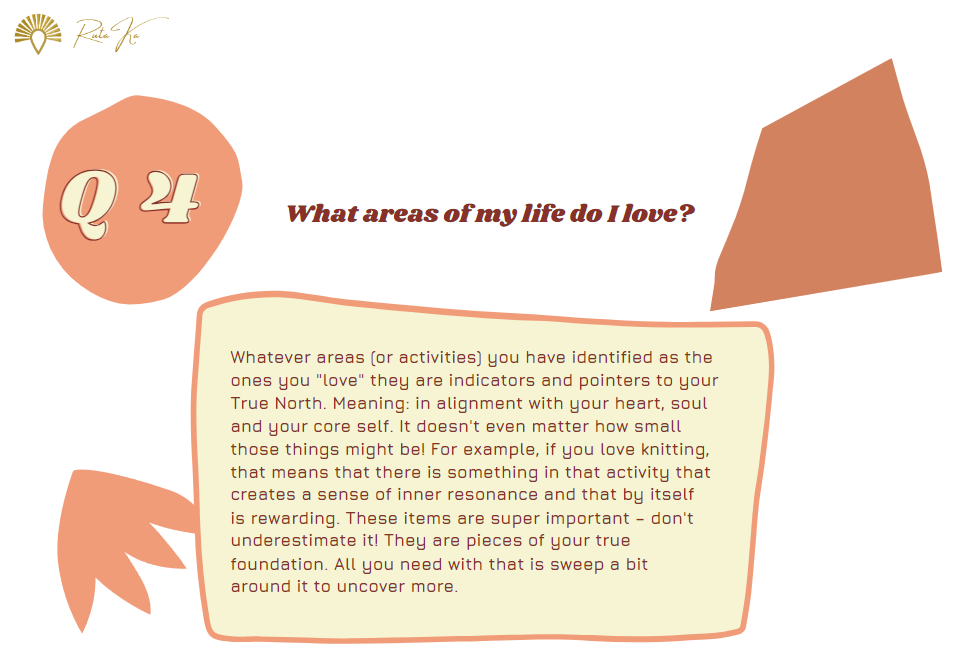
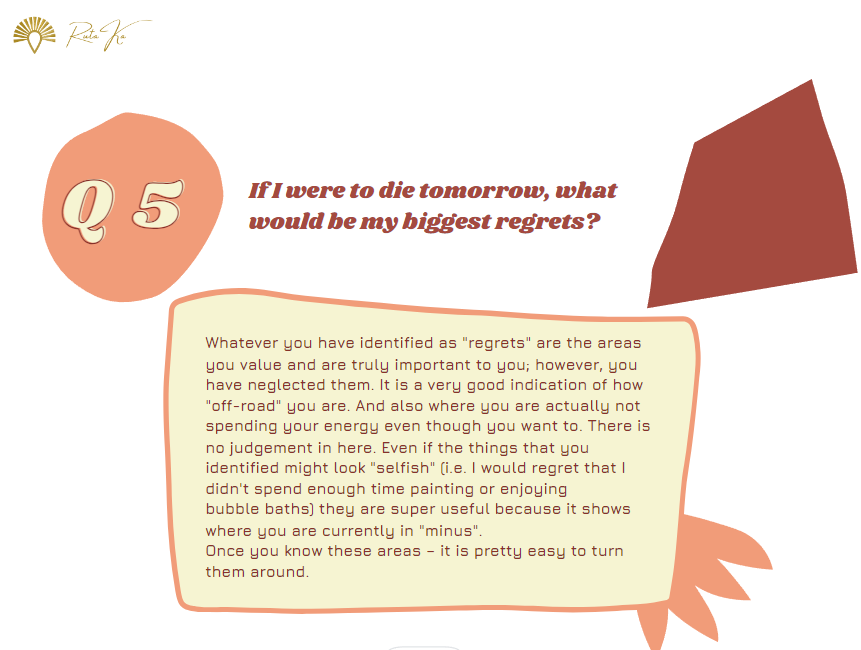
What to do with all of it?
Now, experiment! Listen to yourself, listen to your emotions. Do not invalidate yourself – if you feel something, even though it doesn’t make sense or is not “supposed” to be there – listen to it: that feeling, that emotion has something important to tell you.
Especially if you are doing something and suddenly find yourself feeling that “this is meaningless.”
That means you are really onto something: you have found an element that doesn’t align with the innermost core truth of who you are and how you want to live.
Once you have heard, felt, or seen that – you have an opportunity to revise, refine, to keep or discard, to make it yours.
And once you are in this process of seeing and recognising what fits you, what doesn’t, you will have an opportunity to replace the parts of the foundation in your life with something really strong and solid, something that will make you feel proud and fulfilled.
With all the love & support for you & your journey
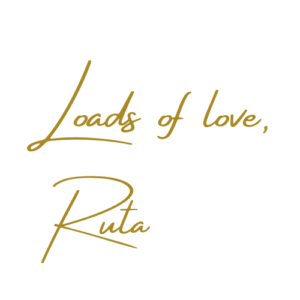
Want to do more and figure out by writing?
Grab your FREE simple guide below.
So if you have any questions or if you want to share anything, please let me know. If you want to reach out to me, if you want to share your experiences, if you want to share your thoughts, if you want to share your ideas, if you want to share your feelings, please let me know. I’m here to help. I’m here to support.




0 Comments